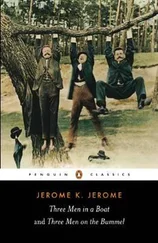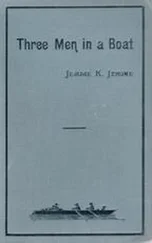Jerome Jerome - Three Men in a Boat (To Say Nothing of the Dog)
Здесь есть возможность читать онлайн «Jerome Jerome - Three Men in a Boat (To Say Nothing of the Dog)» — ознакомительный отрывок электронной книги совершенно бесплатно, а после прочтения отрывка купить полную версию. В некоторых случаях можно слушать аудио, скачать через торрент в формате fb2 и присутствует краткое содержание. Жанр: Юмористическая проза, Классическая проза, на английском языке. Описание произведения, (предисловие) а так же отзывы посетителей доступны на портале библиотеки ЛибКат.
- Название:Three Men in a Boat (To Say Nothing of the Dog)
- Автор:
- Жанр:
- Год:неизвестен
- ISBN:нет данных
- Рейтинг книги:3 / 5. Голосов: 1
-
Избранное:Добавить в избранное
- Отзывы:
-
Ваша оценка:
- 60
- 1
- 2
- 3
- 4
- 5
Three Men in a Boat (To Say Nothing of the Dog): краткое содержание, описание и аннотация
Предлагаем к чтению аннотацию, описание, краткое содержание или предисловие (зависит от того, что написал сам автор книги «Three Men in a Boat (To Say Nothing of the Dog)»). Если вы не нашли необходимую информацию о книге — напишите в комментариях, мы постараемся отыскать её.
Three Men in a Boat (To Say Nothing of the Dog) — читать онлайн ознакомительный отрывок
Ниже представлен текст книги, разбитый по страницам. Система сохранения места последней прочитанной страницы, позволяет с удобством читать онлайн бесплатно книгу «Three Men in a Boat (To Say Nothing of the Dog)», без необходимости каждый раз заново искать на чём Вы остановились. Поставьте закладку, и сможете в любой момент перейти на страницу, на которой закончили чтение.
Интервал:
Закладка:
Shiplake is a pretty village, but it cannot be seen from the river, being upon the hill. Tennyson was married in Shiplake Church.
The river up to Sonning winds in and out through many islands, and is very placid, hushed, and lonely. Few folk, except at twilight, a pair or two of rustic lovers, walk along its banks. `Arry and Lord Fitznoodle have been left behind at Henley, and dismal, dirty Reading is not yet reached. It is a part of the river in which to dream of bygone days, and vanished forms and faces, and things that might have been, but are not, confound them.
We got out at Sonning, and went for a walk round the village. It is the most fairy-like little nook on the whole river. It is more like a stage village than one built of bricks and mortar. Every house is smothered in roses, and now, in early June, they were bursting forth in clouds of dainty splendour. If you stop at Sonning, put up at the "Bull," behind the church. It is a veritable picture of an old country inn, with green, square courtyard in front, where, on seats beneath the trees, the old men group of an evening to drink their ale and gossip over village politics; with low, quaint rooms and latticed windows, and awkward stairs and winding passages.
We roamed about sweet Sonning for an hour or so, and then, it being too late to push on past Reading, we decided to go back to one of the Shiplake islands, and put up there for the night. It was still early when we got settled, and George said that, as we had plenty of time, it would be a splendid opportunity to try a good, slap-up supper. He said he would show us what could be done up the river in the way of cooking, and suggested that, with the vegetables and the remains of the cold beef and general odds and ends, we should make an Irish stew.
It seemed a fascinating idea. George gathered wood and made a fire, and Harris and I started to peel the potatoes. I should never have thought that peeling potatoes was such an undertaking. The job turned out to be the biggest thing of its kind that I had ever been in. We began cheerfully, one might almost say skittishly, but our light-heartedness was gone by the time the first potato was finished. The more we peeled, the more peel there seemed to be left on; by the time we had got all the peel off and all the eyes out, there was no potato left - at least none worth speaking of. George came and had a look at it - it was about the size of a pea-nut. He said:
"Oh, that won't do! You're wasting them. You must scrape them."
So we scraped them, and that was harder work than peeling. They are such an extraordinary shape, potatoes - all bumps and warts and hollows. We worked steadily for five-and-twenty minutes, and did four potatoes. Then we struck. We said we should require the rest of the evening for scraping ourselves.
I never saw such a thing as potato-scraping for making a fellow in a mess. It seemed difficult to believe that the potato-scrapings in which Harris and I stood, half smothered, could have come off four potatoes. It shows you what can be done with economy and care.
George said it was absurd to have only four potatoes in an Irish stew, so we washed half-a-dozen or so more, and put them in without peeling. We also put in a cabbage and about half a peck of peas. George stirred it all up, and then he said that there seemed to be a lot of room to spare, so we overhauled both the hampers, and picked out all the odds and ends and the remnants, and added them to the stew. There were half a pork pie and a bit of cold boiled bacon left, and we put them in. Then George found half a tin of potted salmon, and he emptied that into the pot.
He said that was the advantage of Irish stew: you got rid of such a lot of things. I fished out a couple of eggs that had got cracked, and put those in. George said they would thicken the gravy.
I forget the other ingredients, but I know nothing was wasted; and I remember that, towards the end, Montmorency, who had evinced great interest in the proceedings throughout, strolled away with an earnest and thoughtful air, reappearing, a few minutes afterwards, with a dead water- rat in his mouth, which he evidently wished to present as his contribution to the dinner; whether in a sarcastic spirit, or with a genuine desire to assist, I cannot say.
We had a discussion as to whether the rat should go in or not. Harris said that he thought it would be all right, mixed up with the other things, and that every little helped; but George stood up for precedent. He said he had never heard of water-rats in Irish stew, and he would rather be on the safe side, and not try experiments.
Harris said:
"If you never try a new thing, how can you tell what it's like? It's men such as you that hamper the world's progress. Think of the man who first tried German sausage!"
It was a great success, that Irish stew. I don't think I ever enjoyed a meal more. There was something so fresh and piquant about it. One's palate gets so tired of the old hackneyed things: here was a dish with a new flavour, with a taste like nothing else on earth.
And it was nourishing, too. As George said, there was good stuff in it. The peas and potatoes might have been a bit softer, but we all had good teeth, so that did not matter much: and as for the gravy, it was a poem - a little too rich, perhaps, for a weak stomach, but nutritious.
We finished up with tea and cherry tart. Montmorency had a fight with the kettle during tea-time, and came off a poor second.
Throughout the trip, he had manifested great curiosity concerning the kettle. He would sit and watch it, as it boiled, with a puzzled expression, and would try and rouse it every now and then by growling at it. When it began to splutter and steam, he regarded it as a challenge, and would want to fight it, only, at that precise moment, some one would always dash up and bear off his prey before he could get at it.
To-day he determined he would be beforehand. At the first sound the kettle made, he rose, growling, and advanced towards it in a threatening attitude. It was only a little kettle, but it was full of pluck, and it up and spit at him.
"Ah! would ye!" growled Montmorency, showing his teeth; "I'll teach ye to cheek a hard-working, respectable dog; ye miserable, long-nosed, dirty- looking scoundrel, ye. Come on!"
And he rushed at that poor little kettle, and seized it by the spout.
Then, across the evening stillness, broke a blood-curdling yelp, and Montmorency left the boat, and did a constitutional three times round the island at the rate of thirty-five miles an hour, stopping every now and then to bury his nose in a bit of cool mud.
From that day Montmorency regarded the kettle with a mixture of awe, suspicion, and hate. Whenever he saw it he would growl and back at a rapid rate, with his tail shut down, and the moment it was put upon the stove he would promptly climb out of the boat, and sit on the bank, till the whole tea business was over.
George got out his banjo after supper, and wanted to play it, but Harris objected: he said he had got a headache, and did not feel strong enough to stand it. George thought the music might do him good - said music often soothed the nerves and took away a headache; and he twanged two or three notes, just to show Harris what it was like.
Harris said he would rather have the headache.
George has never learned to play the banjo to this day. He has had too much all-round discouragement to meet. He tried on two or three evenings, while we were up the river, to get a little practice, but it was never a success. Harris's language used to be enough to unnerve any man; added to which, Montmorency would sit and howl steadily, right through the performance. It was not giving the man a fair chance.
"What's he want to howl like that for when I'm playing?" George would exclaim indignantly, while taking aim at him with a boot.
Читать дальшеИнтервал:
Закладка:
Похожие книги на «Three Men in a Boat (To Say Nothing of the Dog)»
Представляем Вашему вниманию похожие книги на «Three Men in a Boat (To Say Nothing of the Dog)» списком для выбора. Мы отобрали схожую по названию и смыслу литературу в надежде предоставить читателям больше вариантов отыскать новые, интересные, ещё непрочитанные произведения.
Обсуждение, отзывы о книге «Three Men in a Boat (To Say Nothing of the Dog)» и просто собственные мнения читателей. Оставьте ваши комментарии, напишите, что Вы думаете о произведении, его смысле или главных героях. Укажите что конкретно понравилось, а что нет, и почему Вы так считаете.












![Helen Rowland - The Widow [To Say Nothing of the Man]](/books/752764/helen-rowland-the-widow-to-say-nothing-of-the-man-thumb.webp)